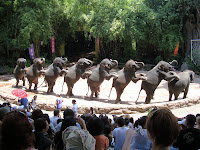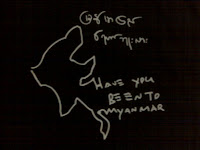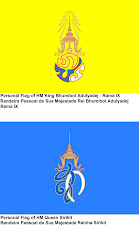 Impressionante a reação do povo ao saber que o Rei foi internado em um hospital durante o final de semana em Bangkok. Dezenas de pessoas correram para o Hospital Siriraj em vigília, prestando saudações e respeito ao Rei para que melhore o mais rápido possível. Aliás, todos temem pela saúde do Rei pois ele é a figura crítica na frágil estabilidade política do país.
Impressionante a reação do povo ao saber que o Rei foi internado em um hospital durante o final de semana em Bangkok. Dezenas de pessoas correram para o Hospital Siriraj em vigília, prestando saudações e respeito ao Rei para que melhore o mais rápido possível. Aliás, todos temem pela saúde do Rei pois ele é a figura crítica na frágil estabilidade política do país. Há cerca de um mês o Rei saiu de um silêncio que durava alguns meses e desabafou que apenas os Thais podem evitar o colapso do país. A mensagem foi curta, mas muito eficiente, pois todos falavam sobre o tema no dia seguinte. Falavam pelos cantos apenas, é claro, ao estilo Thai.
Coincidência ou não, o final de semana foi menos agitado do que se esperava na capital em função do anúncio de novas manifestações pelos "Camisas Vermelhas", oposição ao atual governo, que suporta os anteriores.
A agitação ocorreu na fronteira com o Cambodja, mas prefiro não comentar o banho de sangue ocorrido, difícil de explicar pois foi fruto de muita controvérsia.
Segue a reportagem do Bangkok Post:
"Thailand's revered King Bhumibol Adulyadej, the world's longest-reigning monarch, was being treated in hospital Monday after being admitted with a fever and fatigue, hospital sources said.
The 81-year-old king went to a Bangkok hospital on Saturday night to receive an intravenous saline drip and antibiotics, the royal household bureau said in a statement on Sunday night.
Dozens of Thais went to Siriraj hospital on Monday to sign a book sending their best wishes for the king to get well soon, an AFP photographer said. Some left flowers for the elderly monarch.
A hospital source speaking on condition of anonymity confirmed that King Bhumibol was still being treated at Siriraj but said the royal household was expected to release further details later.
The household statement on Sunday said that the king had "fever, fatigue and loss of appetite. The medical team invited him to go to Siriraj hospital to find the cause and get medical treatment."
"His Majesty has been given intravenous fluids and been provided with antibiotics," it added.
Prime Minister Abhisit Vejjajiva said Sunday that he was aware the king had gone to hospital but insisted it was only for a check-up, adding: "His Majesty's condition is not a problem."
King Bhumibol has long projected an image as the only unifying figure in a nation that has seen 23 prime ministers, 17 constitutions and several coups during his 63-year reign.
While remaining a constitutional monarch, he waded into politics during the 1970s and in 1992, when he ordered military dictatorships to end bloody crackdowns.
Thai children are taught that respect for the king, patriotism and religious devotion are closely intertwined, giving him an almost divine status in Thailand's Buddhist society.
But the monarchy is also protected by strict lese majeste laws under which anyone who insults the royal family can be jailed for up to 15 years.
Last month the king issued the latest in a series of warnings since a September 2006 coup ousted then-prime minister Thaksin Shinawatra that the country could "collapse" if Thailand's feuding political factions do not unite.
Thousands of protesters took to the streets on Saturday, the third anniversary of the coup, to listen to a video speech by the exiled Thaksin.
King Bhumibol was diagnosed as suffering from "mild fever" in December as he celebrated his birthday, causing him to cancel his annual birthday eve speech."
Dozens of Thais went to Siriraj hospital on Monday to sign a book sending their best wishes for the king to get well soon, an AFP photographer said. Some left flowers for the elderly monarch.
A hospital source speaking on condition of anonymity confirmed that King Bhumibol was still being treated at Siriraj but said the royal household was expected to release further details later.
The household statement on Sunday said that the king had "fever, fatigue and loss of appetite. The medical team invited him to go to Siriraj hospital to find the cause and get medical treatment."
"His Majesty has been given intravenous fluids and been provided with antibiotics," it added.
Prime Minister Abhisit Vejjajiva said Sunday that he was aware the king had gone to hospital but insisted it was only for a check-up, adding: "His Majesty's condition is not a problem."
King Bhumibol has long projected an image as the only unifying figure in a nation that has seen 23 prime ministers, 17 constitutions and several coups during his 63-year reign.
While remaining a constitutional monarch, he waded into politics during the 1970s and in 1992, when he ordered military dictatorships to end bloody crackdowns.
Thai children are taught that respect for the king, patriotism and religious devotion are closely intertwined, giving him an almost divine status in Thailand's Buddhist society.
But the monarchy is also protected by strict lese majeste laws under which anyone who insults the royal family can be jailed for up to 15 years.
Last month the king issued the latest in a series of warnings since a September 2006 coup ousted then-prime minister Thaksin Shinawatra that the country could "collapse" if Thailand's feuding political factions do not unite.
Thousands of protesters took to the streets on Saturday, the third anniversary of the coup, to listen to a video speech by the exiled Thaksin.
King Bhumibol was diagnosed as suffering from "mild fever" in December as he celebrated his birthday, causing him to cancel his annual birthday eve speech."
A vida nos diversos bairros da capital e no alto da Torre da Sukhumvit segue calma, ninguém comenta nada, o povo trabalha, mas rezam pelo Rei e ignoram o restante. Ele faz a sua agenda, ao contrário dos jornais.


























